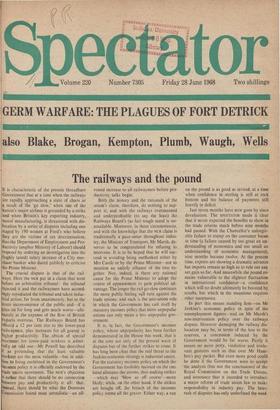The railways and the pound
It is characteristic of the present threadbare Government that at a time when the railways are rapidly approaching a state of chaos as # result of the `go slow,' when one of the 'nation's major airlines is grounded by a strike and when Britain's key exporting industry, mota manufacturing, is threatened with dis- location by a series of disputes including one staged by 190 women at Ford's who believe they are the victims of sex discrimination, that the Department of Employment and Pro- ductivity (anglice Ministry of Labour) should respond by ordering an investigation into the (highly taxed) salary increase of a City mer- chant banker who dared publicly to criticise the Prime Minister.
The crucial dispute is that of the rail- ways. Here the wit put in a claim that went before an arbitration tribunal : the tribunal rejected it and the railwaymen have accord- ingly repudiated the tribunal and taken indus- trial action, far from unanimously, but to the acute inconvenience of the public and—if it goes on for long and gets much worse—ulti- ately at the expense of the flow of British exports overseas. The Railways Board has ffered a 12 per cent rise to the lower-paid railwaymen, plus increases for all geared to igher productivity. The nbtion of special treatment for lower-paid workers is admit- tedly an odd one—Mr Powell has described It as pretending that the least valuable tvotters are the most valuable—but in addi- on, to being enshrined in the Government's 'acmes policy it is officially endorsed by the trade union movement. The NUR'S objection s rather that there should be no connection tween pay and productivity at all: that, t.nstead. there should be what the Donovan round increase to all railwaymen before pro- ductivity talks begin.
Both the history and the rationale of the union's claim, therefore, do nothing to sup- port it; and with the railways overmanned and underprofitable (to say the least) the Railways Board's (so far) tough stand is un- assailable. Moreover, in these circumstances, and with the knowledge that the NUR claim is traditionally a pace-setter throughout indus- try, the Minister of Transport, Mr Marsh, de- serves to be congratulated for refusing to intervene. It is to be hoped that he will suc- ceed in avoiding being outflanked either by Mrs Castle or by the Prime Minister—not to mention an unholy alliance of the two to- gether. Nor, indeed, is there any rational cause for the Prime Minister to adopt the course of appeasement to gain political ad- vantage. The longer the rail go-slow continues the more public feeling %ill turn against the trade unions; and such is the anti-union role in which the Government has cast itself by statutory incomes policy that more unpopular unions can only mean a less unpopular gov- ernment.
It is. in fact, the Government's incomes policy, whose unpopularity has been further demonstrated in the House this week, that is at the core not only of the present wave of disputes but of the further strikes to come. It has long been clear that the real threat to the Jenkins economic strategy is industrial unrest. For the statutory incomes policy on which the Government has foolishly insisted on the one hand alienates the unions, thus making strikes —which may 'blow us off course'—more likely; while, on the other hand, if the strikes are bought off, the breach of the incomes policy seems all the graver. Either way, a run on the pound is as good as invited, at a time when confidence in sterling is still at rock bottom and the balance of payments still heavily in deficit.
Just seven months have now gone by since devaluation. The SPECTATOR made it clear that it never expected the benefits to show in the trade returns much before nine months had passed. With the Chancellor's unforgiv- able failure to stamp on the consumer boom in time (a failure caused by too great an un- derstanding of economics and too small an understanding of economic management). nine months became twelve. At the present time, exports are showing a dramatic advance but imports remain so high as to rule out any net gain so far. And meanwhile the pound re= mains vulnerable to the slightest fluctuation in international confidence—a confidence which will no doubt ultimately be boosted by results, but which in the meantime requires other sustenance.
In part this means standing firm--on Mr Jenkins's economic policy in spite of the unemployment figures----and on Mr Marsh's non-intervention policy over the railways dispute. However damaging the railway dis- location may be, in terms of the loss to the reserves, a concession induced by the Government would be far worse. Partly it means no more petty, vindictive and irrele- vant gestures such as that over Mr Ham- bro's pay packet. But even more good could be done if the Government were to accept the analysis (but not the conclusions) of the Royal Commission on the Trade Unions, and announce that it intended to introduce a major reform of trade union law to make responsibility in industry pay. The latest rash of disputes has only underlined the need.


















































